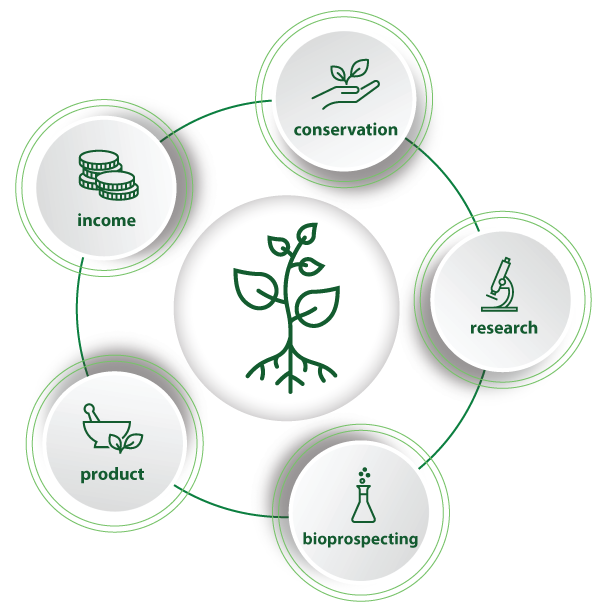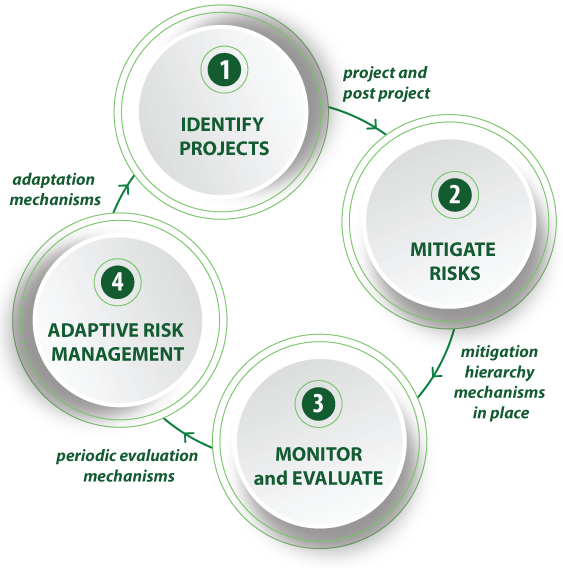GEF- 6 FUNDED PROJECT: BIOPROSPECTING VALUE CHAINS
PROJECT OVERVIEW
South Africa is a megadiverse country, and this diversity is expressed in terms of species richness and endemism. The conservation and sustainable use of South Africa's biological diversity is strategically crucial for the country. So is the maintenance of ecosystem services-now and into the future. This species richness and its associated genetic diversity prove an essential basis for economic growth and development, which underpins the well-being of society.
SOUTH AFRICA'S NATIONAL BIODIVERSITY ECONOMY STRATEGY, 2015
Under the leadership of this department, South Africa launched in 2015 its National Biodiversity Economy Strategy (NBES). The strategy is concerned with supporting the development of businesses and economic activities that either directly depend on biodiversity for their core business or contribute to conserving biodiversity through their activities. An essential segment of the NBES is bioprospecting and, under it, biotrade.
GEF- 6 FUNDED PROJECT
The South African Government, through the DFFE, in partnership with the United Nations Development Programme-Country Office, are implementing the Global Environment Facility (GEF) 6 funded project, which is aligned to achieving the objectives of the Nagoya Protocol on Access and Benefit Sharing, and the draft NBES.
PROJECT OBJECTIVE
Strengthening value chains for products derived from indigenous plants’ genetic resources in view of contributing to the equitable sharing of benefits and conservation of biodiversity.
This objective is with a strong focus on transformation in the bioprospecting value chain as well as improved recognition of the role of traditional knowledge in value chains and ecological sustainability.
PROJECT COMPONENTS + OUTPUTS
ACHIEVEMENT OF PROJECT OBJECTIVE
The project objective has been proposed to be achieved via three technical project outcomes and one dissemination of project lessons outcome. Each project outcome has a variety of project outputs.

COMPONENT 1
OUTPUT 1.1: » AFRICAN GINGER RESEARCH and DEVELOPMENT
OUTPUT 1.2: » NORTHERN CAPE BIOPROSPECTING RESEARCH and DEVELOPMENT HUB
COMPONENT 2
OUTPUT 2.1: » PELARGONIUM SIDOIDES BIODIVERSITY MANAGEMENT PLAN
OUTPUT 2.2: » ALOE FEROX HARVESTING, PROCESSING and TRADING HUB
OUTPUT 2.3: » HONEYBUSH SMALL GRANT FUND
OUTPUT 2.4: » ROOIBOS ABS STRENGTHENING
COMPONENT 3
OUTPUT 3.1: » NATIONAL REGISTRATION SYSTEM
OUTPUT 3.2: » NATIONAL BIOTRADE STANDARD and CERTIFICATION
COMPONENT 4 | » PROJECT RISK MANAGEMENT
|
PROJECT SPECIFICS |
|||||||||
|
COUNTRY |
IMPLEMENTING AGENCY |
EXECUTING AGENCY |
GEF PERIOD |
PROJECT CYCLE |
PROJECT TYPE |
FOCAL AREA |
FUNDING SOURCE |
GEF PROJECT GRANT |
CO- FINANCING |
|
South Africa |
UNDP |
DFFE |
GEF 6 |
5 years (2019 – 2024) |
Full-size project |
Biodiversity |
GEF Trust Fund |
US$ 6 210 046 |
US$ 35 870 564 |
VISION OVER REALISATION OF PROJECT OBJECTIVE
It is envisioned that the realisation of the project objective will eventually lead to the following changes:
CONTRIBUTION TO NATIONAL BIOECONOMY
Bioprospecting R&D focused on indigenous plants will make a more significant contribution to the national bioeconomy owing to at least one new registration with SAHPRA and at least four new market niches explored through sustainable and ABS-compliant value chains in the Northern Cape's bioprospecting economy.
CHANGE WITHIN FIVE STRATEGIC VALUE CHAINS
The approach to ways of working, management conditions and techniques will change within five strategic value chains, to the extent that they become examples of how conservation results (in particular through sustainable supplies of plant raw materials) and ABS-compliance can simultaneously be achieved through cooperation among bioeconomic players.
IMPROVING CAPACITY FOR THE PROTECTION OF TK
National capacity for the protection of traditional knowledge within the bioprospecting segment, as well as the general mainstreaming of both conservation and ABS compliance, will be gradually improved.
1. NO POVERTY
CONTRIBUTION TO SUSTAINABLE DEVELOPMENT GOALS
The outcome of the project contributes to the following sustainable development goals:
5. GENDER EQUALITY
8. DECENT WORK AND ECONOMIC GROWTH
9. INDUSTRY INNOVATION AND INFRASTRUCTURE
12. RESPONSIBLE CONSUMPTION AND PRODUCTION
15. LIFE ON LAND
17. PARTNERSHIPS FOR THE GOALS
PROJECT RISK MANAGEMENT
Although the project outputs will all have positive impacts, the project operates across various socio-ecological and institutional landscapes which could result in unexpected or unwanted negative impacts.
To be sure the project manages all negative risks, the project has implemented a comprehensive risk identification and management plan to maximize social and environmental opportunities and benefits as well as ensure that adverse social and environmental risks and impacts are avoided, minimised, mitigated and managed.The UNDP/GEF6 project risk management framework upholds five project principles ensure positive social and environmental impacts in the project target communities and landscape:
PRINCIPLE 1: leave no one behind. | PRINCIPLE 2: human rights. | PRINCIPLE 4: sustainability. | PRINCIPLE 5: accountability.
Through supporting the objectives of the Nagoya Protocol on access and benefit sharing, the project by design implements a variety of activities that safeguard indigenous knowledge and indigenous communities' rights to access biological resources. Towards achieving these objectives, and remaining true to the principles described above, the project has implemented a comprehensive safeguards management plan in line with both national and international guidelines and policies. The objective of which is to develop, initiate and manage an adaptive social and environmental risk management process. The resulting safeguards are inclusive of an environmental and social impact assessment (ESIA) and environmental and social management plan (ESMP) and stakeholder engagement plan (SEP) with associated annexures.
GET IN TOUCH
We would love to hear from you on your experience or if you have inputs or feedback on the project. Please reach out to the project and we will include you in the project stakeholder database and keep you in the loop of project progress, events and outputs
PROJECT MANAGER
Ms Preshanthie Naicker-Manick
pnaicker@dffe.gov.za
PROJECT OFFICER
Mr Bandile Mkhwanazi
bandile.mkhwanazi@undp.org
PROJECT SUPPORT
Ms Nonhlanhla Skosana
nskosana@dffe.gov.za
PROJECT INTERN
Ms Suzan Khoza
skhoza@dffe.gov.za
PROJECT M&E, SAFEGUARDS AND GRIEVANCE MANAGER
Mr. Khuthadzo Mahamba
The UNDP/GEF6 project adheres to the principles of human rights, gender equality and empowerment, environmental, social and economic sustainability, resilience and accountability. If you feel the project has not stood up to these principles, please express your grievance to the UNDP/GEF6 grievance manager, through the anonymous avenues described below:
- E-mail (preferred): biotradeza@dffe.gov.za direct to UNDP/GEF6 grievance manager
- WhatsApp: 071 506 4221 direct to UNDP/GEF6 grievance manager
- Word-of-mouth directly through any available project officials (DFFE, UNDP, contractors or third parties) who will report to the UNDP/GEF6 grievance manager
- Postal: Private Bag X447, Pretoria, 0001, Environment House, 473 Steve Biko Road, Pretoria, 0002
- Tel: 086 111 2468 (DFFE hotline)
PARTNERS

















